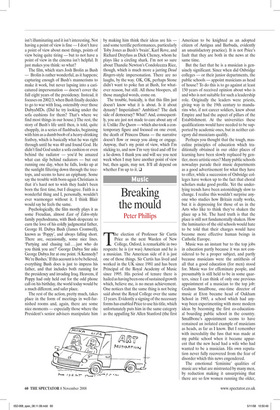Breaking the mould
Peter Phillips
The election of Professor Sir Curtis Price as the next Warden of New College, Oxford, is remarkable in two respects: he is (or was) American and he is a musician. The American side of it is just one of those things. Sir Curtis has lived and worked in the UK since 1981 and has been Principal of the Royal Academy of Music since 1995. His period of tenure there is hailed as having been one of sustained growth which, believe me, is no mean achievement. One notices that the same thing is not being said about the Royal College over the same 13 years. Evidently a signing of the necessary forms has enabled Price to use his title, which unfortunately puts him in the same category as the appalling Sir Allen Stanford (the first American to be knighted as an adopted citizen of Antigua and Barbuda, evidently an unsatisfactory practice). It is not Price’s fault that they are both in the news at the same time.
But the fact that he is a musician is genuinely significant. Since when did Oxbridge colleges — or their junior departments, the public schools — appoint musicians as head of house? To do this is to go against at least 150 years of received opinion about who is and who is not suitable for such a leadership role. Originally the leaders were priests, giving way in the 19th century to mandarins who, if not career soldiers, knew about Empire and had the aspect of pillars of the Establishment. At the universities these qualifications would have needed to be supported by academic ones, but in neither category did musicians qualify.
Perhaps you thought that the tough, masculine principles of education which traditionally obtained in our older places of learning have been slowly replaced by gentler, more artistic ones? Many public schools nowadays parade their music departments as a good advertisement for what they have to offer, while a succession of Oxbridge colleges have woken up to the fact that choral scholars make good profile. Yet the underlying trends have been astonishingly slow to change. I realise this wouldn’t surprise anyone who studies how Britain really works, but it is depressing for those of us in the Arts who like to think they’ve shaken the place up a bit. The hard truth is that the place is still not fundamentally shaken. How the luminaries of the old schools would hate to be told that their charges would have become more effective human beings in Catholic Europe.
Music was an instant bar to the top jobs in education partly because it was not considered to be a proper subject, and partly because musicians were the antithesis of all that a good education (for men) stood for. Music was for effeminate people, and presumably is still held to be in some quarters, since I can think of only one previous appointment of a musician to the top job: Graham Smallbone, one-time director of music at Eton became head of Oakham School in 1985, a school which had anyway been experimenting with more modern ideas by becoming the first co-educational boarding public school in the country. Smallbone’s appointment seems to have remained an isolated example of musicians as heads, as far as I know. But I remember with incredulity the fuss that was made at my public school when it became apparent that the new head had a wife who had wanted to be a musician. His own reputation never fully recovered from the fear of disorder which this news engendered.
The emotional ‘feminine’ qualities of music are what are mistrusted by many men, by reduction making it unsurprising that there are so few women running the older, until recently all-male schools and colleges, even though most of those establishments have been admitting women as students for decades. There can be no better advertisement for women as heads of house than at my own college of Merton, where Dame Jessica Rawson, Warden since 1994, has built up one of the most formidably successful reputations in the university. Under her guidance academic standards have never been so high; and we are all enjoying the new Choral Foundation she encouraged, now well-launched.
Of course this success is unpopular elsewhere, all the more so among her vastly more numerous male peers for her not being one of them.
So Sir Curtis really does seem to have broken a mould. Time alone will tell whether, like Thatcher, he is more of the same in different clothes, or whether music really can produce satisfactory leaders. And if Obama wins this election I shall willingly take my hat off to two pioneering Americans who have found the inspiration to face down the dreary old conservative way of doing things. ❑



















































































 Previous page
Previous page